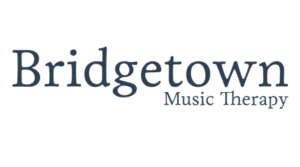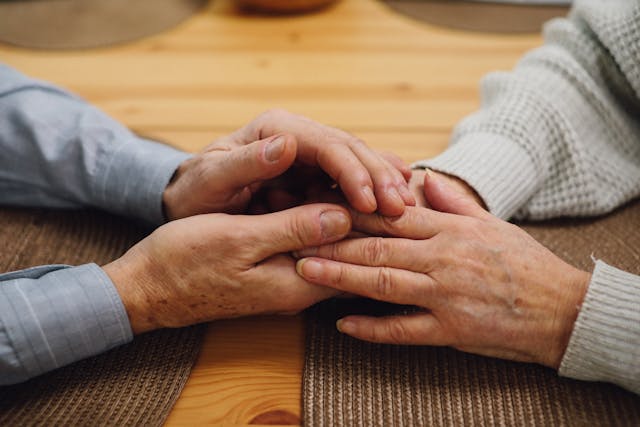A Practical Guide to the Therapeutic Power of Music in Dementia Caregiving
 Submitted by Alexis Baker, MT-BC, CDP
Submitted by Alexis Baker, MT-BC, CDP
Founder, Owner & Music Therapist
Bridgetown Music Therapy
Music has a remarkable ability to transcend barriers and connect with individuals on a deep emotional level. For people living with dementia, music can be more than just entertainment – it can be a powerful therapeutic tool that enhances quality of life and improves overall well-being.
In this practical guide, we’ll explore the therapeutic power of music in dementia caregiving, including its benefits, applications, and tips for integrating music into daily care routines.
Understanding Dementia and Its Challenges
Before delving into the therapeutic aspects of music, it’s essential to understand dementia and the challenges it presents. Dementia is a progressive neurological condition characterized by a decline in cognitive function, memory loss, and changes in behavior. Alzheimer’s disease is the most common form of dementia, accounting for around 60-70% of diagnoses.
Caring for someone with dementia can be emotionally and physically demanding. Caregivers often face challenges such as communication difficulties, personality changes, agitation, and social isolation. These challenges can take a toll on both the caregiver’s and the care recipient’s well-being, highlighting the need for effective and holistic care approaches.

The Therapeutic Benefits of Music for People with Dementia
Music has long been recognized for its therapeutic benefits, especially for individuals with dementia. Here are some of the ways in which music can positively impact people with dementia:
Emotional and Cognitive Stimulation

Music has the power to evoke emotions and memories, even in individuals with advanced dementia. Listening to familiar songs can stimulate cognitive processes, improve mood, and reduce anxiety and agitation.
Enhanced Communication
Many people living with dementia struggle with verbal communication, and music can serve as a means of expression. Singing, humming, or playing musical instruments can help them connect with others and express their emotions nonverbally.
Improved Memory
Music has a unique ability to evoke memories from the past. Listening to music that holds personal significance can trigger memories, spark conversations, and enhance reminiscence therapy – a technique that uses past experiences to improve mood and cognitive function.
Promotion of Physical Well-Being
Engaging with music, whether through singing, dancing, playing instruments, or rhythmic movements, can promote physical activity and coordination. This can be particularly beneficial for maintaining mobility and motor skills in people living with dementia.
Reduced Stress and Agitation
Music has a calming effect on the brain, leading to reduced stress levels and decreased agitation in people with dementia. Calming melodies, nature sounds, and specially curated playlists can create a soothing environment conducive to relaxation and well-being.
Practical Applications of Music in Dementia Care
Integrating music into dementia care doesn’t require extensive musical knowledge or resources. Here are some practical ways caregivers can harness the therapeutic power of music:
Create Personalized Playlists
Compile a collection of your care recipient’s favorite songs from their teens through their early adult years or songs that hold sentimental value. Include a variety of genres and styles to cater to different moods and preferences.
Use Music in Routine Activities
Incorporate music into daily routines such as mealtime, bathing, and exercise. Playing calming music during these activities can make them more enjoyable and less stressful for both caregiver and care recipient.
Encourage Active Participation
Encourage your person with dementia to actively engage with music by singing along, clapping, or playing simple instruments like tambourines or shakers. This active participation fosters a sense of accomplishment and helps activate the various dimensions of wellbeing.
Explore Dementia-friendly Music Programs
Consider seeking music therapy offered by a trained and certified professional. Music therapists use evidence-based techniques to address specific goals such as improving communication, reducing anxiety, and enhancing emotional well-being. If formal music therapy services aren’t an option, check out Bridgetown Music Therapy’s dementia-friendly program, which was created by a music therapist.
Create Musical Memories
Organize music-themed activities such as karaoke sessions, sing-alongs, or dance parties. These activities not only provide entertainment but also create opportunities for social interaction and joyful experiences.

Tips for Caregivers Using Music in Dementia Care
As a caregiver incorporating music into dementia care, here are some helpful tips to maximize the therapeutic benefits:
Observe and Respond
Pay attention to how your care recipient responds to different types of music. Some may prefer soothing songs, while others may enjoy lively tunes. Adjust the music accordingly to create a positive and comfortable atmosphere.
Be Patient and Flexible
People living with dementia may experience fluctuations in mood and engagement. Be patient and flexible with your approach to incorporating music into dementia caregiving, adapting to your care recipient’s needs and preferences in the moment.
Create a Calming Environment
Use music to create a calming environment during potentially stressful situations, such as medical appointments or transitions between activities. Soft instrumental music or nature sounds can help promote relaxation and reduce anxiety.
Encourage Social Interaction
Music has a unique ability to bring people together. Encourage family members, friends, and other caregivers to join in music-based activities, fostering social connections and emotional bonds.
Document and Reflect
Keep a journal or record of the music-oriented activities you try and their effects on your person with dementia. Make note of any changes in mood, behavior, and cognitive function to track progress and adjust interventions as needed.
The Value of Music
Music is a valuable tool in dementia caregiving, offering a range of therapeutic benefits for caregivers and care recipients alike. By understanding the unique ways in which music can stimulate cognition, evoke emotions, and improve overall well-being, caregivers can incorporate music into daily care routines effectively.
Whether through personalized playlists, dementia-friendly music programs, or creative activities, harnessing the therapeutic power of music can enhance the quality of life for individuals living with dementia and create meaningful connections that transcend the limitations of the condition.
 Submitted by Alexis Baker, MT-BC, CDP
Submitted by Alexis Baker, MT-BC, CDP
Founder, Owner & Music Therapist
Bridgetown Music Therapy
Alexis Baker is a licensed and board-certified music therapist of 10 years. She has always loved older adults and is passionate about using music to make a difference in their lives, especially those living with dementia.
In 2017, Alexis founded Bridgetown Music Therapy with the mission to serve individuals and groups in dementia care by sparking joy and improving quality of life through meaningful music engagement!
